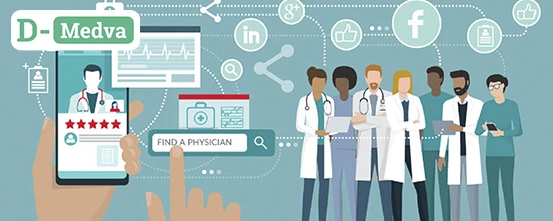How SEO Keywords Improve Patient Experience and Drive Website Traffic
Introduction In today’s digital age, having a strong online presence is essential for healthcare providers. Patients increasingly rely on the internet to find medical information, book appointments and choose healthcare professionals. This shift makes it crucial for doctors to ensure their websites are easily accessible and informative. One of the most effective ways to achieve this is through search engine optimization, commonly known as SEO. SEO helps healthcare websites rank higher on search engine results pages, making it easier for patients to find them. By using well-researched keywords, doctors can attract the right audience and offer valuable content that meets patient needs. A well-optimized website not only improves visibility but also enhances the overall patient experience by providing reliable and accessible information. For healthcare professionals, Digital Marketing for Doctors plays a vital role in connecting with patients. SEO keywords tailored to patient needs ensure that medical websites address common questions, offer relevant services and build trust. This strategy not only drives website traffic but also improves patient satisfaction by delivering high-quality, easy-to-find content. The Role of SEO in Enhancing Patient Experience A positive patient experience starts with accessible and relevant information. When patients search for medical advice or healthcare providers online, they expect to find clear, accurate and timely content. SEO helps deliver this by aligning website content with the most common and important patient queries. One way SEO improves patient experience is by optimizing website structure and navigation. A well-organized website allows patients to quickly find information about services, office hours and appointment booking. Clear headings, descriptive titles and properly labeled pages enhance usability, reducing frustration and encouraging longer visits. Keyword optimization ensures that content addresses patient concerns. Using terms patients commonly search for helps medical websites appear in relevant search results. This targeted approach not only drives traffic but also ensures visitors find the information they need without extensive browsing. For doctors, investing in digital marketing for doctors translates into better patient engagement and satisfaction. Boosting Website Traffic with Strategic Keyword Use Creating Valuable Content for Patient Education Educational content is a cornerstone of effective healthcare websites. Patients often seek medical advice, treatment options and health tips online. Providing accurate and easy-to-understand information not only builds trust but also positions doctors as reliable sources of knowledge. SEO-driven content addresses patient questions and concerns. By using keywords aligned with common health topics, doctors ensure their articles and pages appear when patients search for related information. This approach helps attract the right audience while offering valuable insights that empower patients to make informed decisions. Consistent content updates keep websites relevant and informative. Regularly publishing blog posts, FAQs and health guides enhances website authority and search engine performance. As part of a comprehensive Digital Marketing for Doctors strategy, high-quality content boosts engagement and encourages repeat visits. Improving Local SEO for Better Patient Reach Local SEO plays an essential role in connecting doctors with patients in their area. Many patients prefer healthcare providers located nearby, making it important for medical websites to appear in local search results. Optimizing for local SEO ensures that doctors remain visible and accessible to their community. Accurate business information enhances local search visibility. Ensuring that practice names, addresses and phone numbers remain consistent across online directories improves search engine trust. This consistency helps medical websites rank higher in local searches, increasing appointment bookings and patient inquiries. Patient reviews and testimonials also strengthen local SEO. Positive feedback not only builds credibility but also influences search rankings. Encouraging satisfied patients to share their experiences online enhances the practice’s reputation and supports a strong digital marketing for doctors strategy. Enhancing Website Performance for Better User Experience Website performance directly impacts patient satisfaction. Slow loading times, broken links and difficult navigation frustrate users and increase bounce rates. Ensuring a seamless online experience encourages visitors to stay longer and explore more content. Mobile optimization improves accessibility. With many patients using smartphones to search for healthcare services, responsive website design ensures compatibility across devices. Easy-to-use mobile sites enhance user experience and contribute to higher search engine rankings. Page speed optimization reduces wait times and improves engagement. Compressing images, minimizing scripts and enabling browser caching create a faster browsing experience. A well-performing website not only attracts more traffic but also keeps visitors engaged, supporting overall digital marketing for doctors efforts. Leveraging Analytics to Refine SEO Strategies SEO keywords play a vital role in improving patient experience and driving website traffic. By aligning website content with patient needs and search behavior, doctors enhance online visibility and engagement. A well-optimized website offers accessible, accurate and valuable information, building trust and satisfaction. Investing in digital marketing for doctors supports comprehensive patient outreach. From educational content to local SEO, strategic keyword use strengthens the connection between healthcare providers and their communities. Consistent content updates, performance enhancements and data-driven strategies ensure long-term success. Maintaining a strong online presence requires ongoing effort and adaptation. By prioritizing patient experience and search optimization, doctors create informative and user-friendly websites. This approach not only drives traffic but also fosters lasting patient relationships and practice growth.










